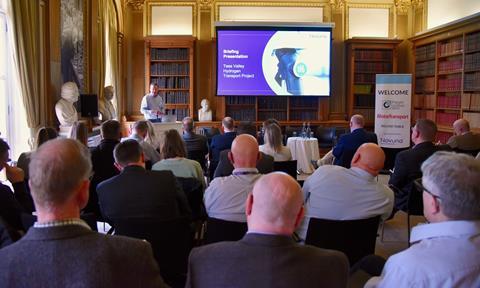We recently partnered with Novuna Vehicle Solutions to host a fleet roundtable briefing on a new fuel cell truck trial in the Tees Valley. This, and other hydrogen fuel cell vehicle trials will be crucial in the industry’s understanding and learnings about the application of hydrogen to the UK commercial vehicle fleet.

What do you get when you combine a vehicle leasing specialist, a start-up German truck manufacturer, an energy infrastructure provider, a fuel cell manufacturer, and a leading university, with £7m of UK government funding through the Department for Transport? Answer: A powerful and knowledge-rich consortium tasked with delivering the first large-scale deployment of hydrogen fuel cell electric HGVs in the UK.
Why is this big news? Well, the road transport industry is well advanced in understanding the pros and cons of battery electric vehicles (BEVs), but until now, hydrogen fuel cell trucks have not received the same level of focus or investment as BEVs, which has limited their viability for most transport operators. These trials will be crucial in rapidly building the knowledge base and understanding around hydrogen as a road transport fuel.
This part of the new Department for Transport funded project will put 16 fuel cell electric vehicles (FCEVs) into operation across a mix of sectors, providing key data on how the hydrogen trucks perform in real-world conditions. The project funding will also be used to build the necessary infrastructure to support the refuelling of the hydrogen fleets.
Unveiling the detail of the Tees Valley Hydrogen Vehicle Ecosystem (HYVE) project at an event in London for road transport operators and other interested stakeholders, the consortium members shared their credentials and how the trial will work.
Meet the project players
The HYVE Consortium is led by sustainability experts ERM (Environmental Resources Management) and consists:
Novuna Vehicle Solutions – fleet leasing provider Novuna is a key partner leading on the building, funding and management of the in-life maintenance of the hydrogen vehicles.
Quantron – German vehicle manufacturer Quantron is providing the FCEVs for the trial, working closely with Novuna.
Exolum – energy infrastructure specialist Exolum is building a hydrogen production plant and refuelling station for the project at its Riverside terminal in Stockton-on-Tees.
Teesside University - the university’s School of Computing, Engineering and Digital Technologies, and its Net Zero Industry Innovation Centre, are overseeing the data monitoring and performance evaluation of the hydrogen trial vehicles.
The leasing provider
Novuna Vehicle Solutions has been building and leasing commercial vehicles for over 40 years and is a leading advocate for zero-emission vehicles with over 2,000 electric LCVs and HGVs on its fleet.
Leading on the build, fund and management of the hydrogen-powered trucks involved in the Tees Valley trial, Novuna is working closely with all the consortium partners to ensure the project goes live on time next year.

“We are aiming to have the vehicles in operation with trial participants by March 2025. The trial vehicles will be a mix of a 4.25 tonne derogation chassis-cabs, a 7.2 tonne and a 19-tonne rigid. We are working with a number of operators including utilities, home deliveries, logistics and supermarkets.”
James Bligh, National Sales Manager, Novuna
Aside from the build and fund management, Novuna’s role includes fleet and maintenance management to ensure operators are getting the reliability and range they expect from the vehicles; as well as working with ERM and Teesside University to evaluate the insights and learnings from the trial.
“Because we have such different operations and different types of vehicles in the trial, it’s going to be a real contrast and exciting to see operationally how the FCEVs perform across the different sectors,” adds Bligh.
Motor Transport and Freight Carbon Zero will be working with Novuna to run further roundtable briefing events for fleets throughout the country to track the progress of the project, with the next one running in Birmingham in mid-June – watch out for further details.
The vehicle manufacturer
Specialising in the production of “glider chassis” vehicles to battery and hydrogen-electric drives, Quantron has been steadily growing since its inception in 2019. The Tees Valley hydrogen trial marks the German firm’s first entry into the UK market, and the manufacturer is keen to support UK operators in their decarbonisation journey with its range of zero emission vehicles.

“Commercial vehicle operators need electric vehicles today; it takes too much time and cost to produce brand new BEVs and FCEVs, and operators cannot wait until 2030. This is why we prefer to make use of what’s already on the market and use existing vehicles.”
Sharon van Beek, International Key Account Manager, Quantron
Quantron typically works with just a few models of vehicle – the Iveco Daily, MAN TGS and MAN TGX - as the company has learnt from experience they are most suited to electrification technology.
In terms of the trial, Quantron are providing 12 Quantron QLI FCEV light transporters between 4- to 7-tonnes with a range of up to 450km; and two QHM FCEV heavy trucks weighing in at 19-tonnes with a range of 700km. The Quantron heavy is also available as a 44-tonne model for the UK market, but this vehicle won’t be part of the Teesside trial.
Van Beek describes the lighter Quantron QLI as the “perfect vehicle for last mile deliveries” as there is no trade off in payload or range compared to a diesel. “We build all the components of the hydrogen fuel cell technology into the chassis of the vehicle, which means design-wise, there is no compromise; the vehicle looks exactly the same as its diesel sister. We can also put any body on top of the vehicle,” she says.
In terms of the heavy QHM FCEV, it too has all the components built into the chassis meaning no compromise on payload or range. The vehicle has a tank capacity of 54kg and is compatible with 350 or 700 bar fueling (more on this later). Quantron also offers a special aero kit on the heavy that optimises the efficiency of the vehicle by 10%, translating into an additional 70km extra range per charge, the company says.
The infrastructure expert
Exolum might not be a household name, but it is a central player in the energy sector, operating a vast network of pipelines and storage facilities across several countries, primarily in Europe, managing the logistics and distribution of various energy products. In the UK, it is the leading supplier of bulk liquid logistics, transporting jet fuels to the major airports, as well as road fuels.
The Tees Valley project is not a hydrogen first for Exolum – it has already built Madrid’s first hydrogen production and refuelling facility, and has successfully been refuelling buses and cars there since summer 2023 – and the same team are feeding into the Tees Valley trial.
Armed with £2m of funding from the DfT to build the Tees Valley hydrogen refuelling station – and an additional £3m of funding to construct a 5 MW water electrolyser capable of producing up to 2 tonnes of green hydrogen per day – Exolum is confident of delivering a robust hydrogen station with maximum uptime and availability of hydrogen.
“Our station will be capable of refuelling one and half tonnes of hydrogen per day which is far greater than the initial demand predicted for the first two years, so there won’t be an issue with supply,” explains Henry Story, Project Developer at Exolum.
The energy expert is also developing the means for hydrogen to be stored at the correct pressure to enable vehicles to be refuelled back-to-back to avoid drivers queuing at the pumps while the hydrogen repressurises (a common problem with existing hydrogen stations).

“Ultimately, we want to create the same refuelling experience as diesel for operators at our new refuelling station in Middlesborough when it opens in 2025,” says Story. “A lot of hydrogen fuel projects involve multiple players – the hydrogen producer, the distributor, and the station operator – but here Exolum are doing everything, we are managing the whole thing so essentially we are creating an all-in-one solution.”
Henry Story, Project Developer, Exolum
Speaking at the event, Story emphasised Exolum sees the Tees Valley refuelling station as the first of many in the UK, with the creation of a “hub and spoke” model that will see it create more refuelling stations that will be fed from its Riverside hub with the green hydrogen produced on site. On price, he revealed Exolum is working hard to create a stable price for hydrogen fuel, using a recognised price index to avoid volatility.
The data collator
The key piece of the trial that everyone will be waiting for is the data collection. With extensive experience in the fuel cell field, the School of Computer Engineering and Digital Technologies at Teesside University will be handling the monitoring and performance evaluation of the hydrogen vehicles once they begin operating. This is arguably the most crucial part of the trials as the evaluation of the data will inform the future decision making of the whole road freight sector.
The university has a strong track record in operational evaluation through the work is carries out at its innovation centre where it has a comprehensive programme of hydrogen and other low and zero carbon project experience.
Performance metrics including range, fuel cell performance, fuel economy, and hydrogen performance will be assessed, along with fuelling behaviour such as frequency of refuelling and time of day of refuelling. Having real-world data on fuel cell vehicles will then enable the university team to create modelling and predictions using machine learning.

“We’ll be able to train the system to create more accurate models once the data starts flowing in. We can then start looking at what an operator can expect in terms of range from an FCEV if certain factors are in place such as type of terrain, length of journeys, and payload, applying this to the operational duty cycles of the different use cases. We know this is the sort of information the industry is asking for and will rely on as it makes future purchasing decisions.”
Huda Dawood, Associate Professor at Teesside University.
The fuel cell technologist
While not a consortium project partner, we were also joined by leading hydrogen fuel cell provider Ballard Power Systems at the roundtable. This global leader is the fuel cell supplier for the Quantron vehicles. Established 45 years ago in Canada, Ballard has invested over $1.5bn in fuel cell technology and is in its 14th generation of stack technology, and eighth generation of module technology. It has supplied fuel cells to over 2,300 trucks and 1,500 buses, along with other modes of transport including shipping and rail. Ballard is the only manufacturer to have a marine type approval for a fuel cell and is powering the world’s first hydrogen ferry in Norway.
Speaking at the event, Ballard’s market development manager John Winterbourne, shared that the fuel cell specialist has now passed the 200-million-kilometre mark with vehicles powered by its fuel cell technology. “The critical thing for UK operators to know is that Ballard has experience; I don’t think there’s any other company that can show the same level of experience in hydrogen fuel cell technology,” he added.

Ballard’s latest FCmove-XD module has been specifically designed for medium and heavy duty commercial vehicles, and is commercially available this year. It is designed with engine bay configuration in mind, making it practical for installation, operation, maintenance, and safety.
Highlighting the benefits of Ballard’s fuel cell technology, Winterbourne commented: “With our fuel cell technology we are able to stretch the range of a vehicle to maintain the cargo capacity. So, when we reach a 300-mile range, we’re seeing a 30% advantage over BEV with a fuel cell application.”
Next steps and hydrogen expansion plans
The five consortium members are on track to get all elements of the trial in place for the vehicles to go live in March 2025. The trial will run for six months with the data collated, analysed and the key learnings then shared publicly.
The expectation is that all 16 vehicles will continue in operation after the trial with the trial participants, while plans are afoot to expand the UK’s hydrogen capabilities for commercial vehicles.
Exolum’s Henry Story revealed the company sees the Tees Valley project as “ripe for being copied and pasted” around the UK. “With our infrastructure footprint located around major logistics and industrial hubs across the country, we can see ourselves starting to develop a national network of hydrogen refuelling stations,” he says. “We’ve already started looking at similar projects across the country.”
Novuna’s James Bligh shared the leasing firm is in dialogue with other companies that are planning [hydrogen] infrastructure across the UK. “Over the next two to three years, we expect to see an increased interest and demand for hydrogen solutions. Planning is in place for 10-15 hydrogen infrastructure sites to be built across the UK, which will have a similar capacity to the Teesside facility. We are on the cusp of a very exciting development.”
Under the government’s zero emissions vehicle mandate, van manufacturers have to start producing a certain percentage of electric vans from this year (10%), which increases steadily every year until 70% in 2030. This means that Euro-6 diesel vans will be harder to secure and prices will shoot up because of supply and demand.
“We anticipate the government introducing similar electric vehicle targets for truck manufacturers, so we need to find a viable replacement for Euro-6,” explains Bligh. “We believe hydrogen is a viable, realistic solution for both vans and trucks.”
Quick-fire questions on the new hydrogen Tees Valley project:
Q: Will the electricity be ‘clean’ electricity that’s used in the new hydrogen refuelling station at Riverside?
A: Yes, Exolum says it will use a mixture of renewable sources - likely to be solar and wind farms - and will be able to confidently say where it has secured its electricity from.
Q: How long will it take to refuel a hydrogen vehicle at the new refuelling station?
A: Approximately 10 minutes, depending on the vehicle.
Q: Do the drivers need to be trained or have special skills to refuel a hydrogen vehicle?
A: It is very similar to refuelling a diesel vehicle, but training may be offered to drivers if it is required.
Q: Can the refuelling station handle both 350 bar and 700 bar refuelling?
A: Yes, there will be a nozzle for 350 bar and a nozzle for 700 bar.
Q: Are hydrogen fuel cells heavier or lighter than BEVs? Ie what effect is there on payload?
A: Hydrogen fuel cell vehicles are lighter than battery electric vehicles, though slightly heavier than the legacy diesel vehicles. For a 3.5t chassis cab vehicle for instance the FCEV penalty over a diesel vehicle is approximately 200kg, while a BEV is approximately 750kg heavier than the diesel equivalent.
Q: What’s being done to drive down the cost of hydrogen vehicles?
A: Novuna Vehicle Solutions is developing a range of new financial services and funding strategies to suit the requirements of fleet operators. Ballard’s work in the fuel cell sector through design improvements, reducing part count and working on joint supplier component development will mean component costs will reduce as market scale increases. Its latest fuel cell module has 20% fewer parts compared to its predecessor, and it has achieved a 50% reduction in assembly time, all of which helps balance out the cost of the technology. Meanwhile, Exolum is working on ways to stabilise the cost of supply of hydrogen using a standard price index.
Proof of concept
Keen to prove its hydrogen vehicles really do deliver, Quantron shared a customer case study from Vienna, where Ikea has been running five of the QLI light transporters for city centre deliveries. Since go-live in February 2024, the five vehicles have clocked up 22,585km in six weeks (indicating heavy use) but have achieved an overall uptime of 97.6%, and saved over nine tonnes in CO2 emissions.
“To achieve an uptime of 97.6% is absolutely great for this new type of technology that was implemented in an existing fleet,” enthuses van Beek. “The 2.4% downtime is quite normal as you will always have a tyre change or other minor maintenance issues that occur, but the 97.6% uptime we believe is good proof of concept that the fuel cell technology is doing exactly what it needs to do.”
Supporting documents
Click link to download and view these filesHYVE Briefing Document
PDF, FileSizeText 3.53 mb

















